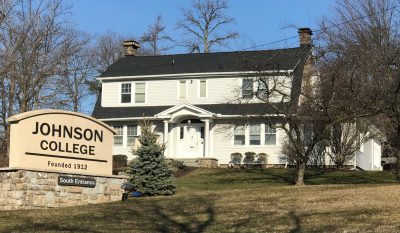Johnson College is now enrolling for its Spring 2022 Distance Learning Program for high school and adult students in the rural areas of Wayne, Pike, and Susquehanna counties. The program launches on January 18, 2022. It creates a direct route for students to complete any of Johnson College’s eighteen 2-year associate’s degree programs and ultimately a fulfilling career with family-sustaining wages while staying in their communities. To learn more about this program or to register for courses listed below, please visit https://johnson.schoolforms.org/usda-registration-Spring2022 or email the Johnson College enrollment team at enroll@johnson.edu.
Students will have interactive, two-way access to Johnson College faculty and participate in remote education, discussions, testing, and skill demonstrations via high-tech telecommunications equipment in classrooms at Forest City Regional High School, Honesdale High School, Wallenpaupack Area High School, and Western Wayne High School. In addition, Lakeville Library, Newfoundland Library, and Pleasant Mount Library will be equipped with laptops to give community residents access to career exploration services and information about courses at Johnson College.
In addition to the distance learning opportunity, this program provides, students will have access to Johnson College’s full array of on-campus support services including tutoring, counseling, career services, financial aid, internship opportunities, and exposure to industry from day one. Distance learning will help high school and adult students reach their full potential and connect with the region’s essential careers already in demand.
This program is funded in part by a grant from the United States Department of Agriculture’s Distance Learning and Telemedicine Grant Program.
Courses at Honesdale High School
WTC 151-1 – Shielded Metal Arc Welding – Mondays & Wednesdays, 5 p.m. – 5:50 p.m.
WTC 152-1 – Shielded Metal Arc Welding Lab – Mondays, Tuesdays & Wednesdays, 6 p.m. – 9 p.m.
WTC 155-1 – Gas Metal and Flux Coed Arc II – Tuesdays, 5 p.m. – 5:50 p.m.
WTC 156-3 – Gas Metal & Flux Coed Arc Lab II – Thursdays, 5 p.m. – 9 p.m.
Courses at Wallenpaupack Area High School
PRG 103-1 – C Sharp – Thursdays, 3 p.m. – 5:50 p.m.
DAT 201-1 – Database: Principles & Applications – Thursdays, 6 p.m. – 8:50 p.m.
BUS 105-1 – E-Commerce – Online, Available Anytime
Courses at Western Wayne High School
VMR 151-1 – Introduction to Vehicle Maintenance – Online, Available Anytime
IET 101-1 – Introduction to Automotive & Diesel Electronics – Wednesdays, 5 p.m. – 6:50 p.m.
MATH 105-1 – Math for Transportation Division – Thursdays, 5:30 p.m. – 8:30 p.m.
Courses at Forest City Regional High School
BUS 101-4 – Introduction to Business – Tuesdays, 5:30 p.m. – 8:30 p.m.
LOG 192-1 – Transportation Management – Online, Available Anytime
CDT 101-1 – Introduction to Civil Design – Tuesdays, 5 p.m. – 7:50 p.m.
SCI 160-1 – Sustainability Design – Online, Available Anytime


